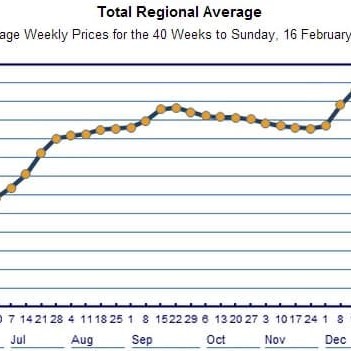
DIESEL fuel prices across regional and rural parts of Australia have stabilised, after shooting to three-year highs since the start of the year.
The softening Australian dollar and high demand for distillate-based fuels for heating during the extreme northern hemisphere winter in Europe and North America have been blamed for diesel prices hitting near-record levels since January.
As our graph shows, prices have eased only marginally since then, with a national average price for regional and rural areas of 163.4c.litre for the week ended Sunday, February 16, in the latest survey conducted by the Australian Institute of Petroleum.
That’s a decline of 0.8c/l since the mid-January high-point, but is still +15c/litre more than the recent low point of 148c/l back in May last year.
The recent decline in the value of the A$, falling into the US89s recently after sitting above US105c this time last year, has made imported fuel oil more expensive. Australia is only about 40pc self-sufficient in transport fuels, meaning international market trends have a direct impact on local pricing.
Political disturbances in the oil-producing Middle East region, particularly Syria, Iran and Egypt, and early economic recovery in the US, lifting oil demand, have also contributed to the recent rise, energy analysts say.
Filling a Toyota Landcruiser 200 series (138 litres, main and auxiliary tanks) today would cost $21.20 more than the same fill back in mid-May last year.
Biggest fuel price movements since last month were seen in South Australia, Qld and WA. The Northern Territory went against the trend, recording a small increase.
Regional non-metro diesel prices in the latest AIP report included:
- Victoria 160.5c/litre (down 0.7c/litre since mid-January)
- NSW 163.5c (down 0.4c)
- Queensland 163.3c (down 1.3c)
- WA 166.3c (down 0.9c)
- SA 162c (down 5.6c)
- TAS 168.5c (unchanged), and
- NT 178.4c (up 0.2c).
 The prices are calculated as a weighted average of retail diesel fuel for country regions in each state/territory. All values include GST.
The prices are calculated as a weighted average of retail diesel fuel for country regions in each state/territory. All values include GST.
Variation in fuel prices can have a considerable impact of cost of production across the Australian beef industry, impacting on livestock transport, cost of shipping in live cattle and boxed beef exports, pumping stock water and providing station electricity in remote locations.
Crude oil, diesel and petrol prices are closely linked, as the price of crude oil accounts for the majority of the cost of producing a litre of petrol or diesel. Crude oil is purchased in US$, meaning that changes in the value of the A$ against the US have a direct impact on the relative price of crude oil in A$ terms.
